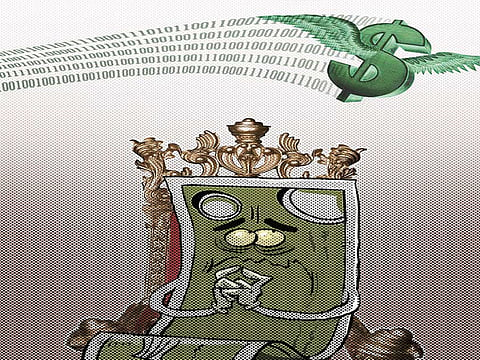Need to move away from cash is king mindset
The UAE’s upcoming Digital Wallet initiative will redress the imbalance

“Cash in your Pocket” — this is very likely to catch your attention. And it has, apparently.
More than likely it is because we have such a strong emotional bond with cash. Depending on where you are and how old you are, cash represents wealth, security, access to society, and, sometimes, even health. But cash has its downsides, some of them of serious concern to policymakers and law enforcement officials.
This is why the UAE has decided to go beyond cash, and with the Emirates Digital Wallet has developed a unique way of doing so. Cash costs money, to produce, protect, transport and handle. It also sits — in very large quantities — unproductively outside the active economy, sometimes for long periods of time.
According to the Central Bank, at the end of March Dh65.4 billion was in circulation outside banks in the UAE, or Dh7,000 for every resident of the UAE, in cash.
But there is another, more personal, issue at play here. As a society, we are ready adopters of technology that makes our lives easier or more fulfilling. Just think what you can do with your smartphone, far beyond it being a telephone.
It has so many built-in and app-driven solutions that help us take and share photographs, communicate, navigate, purchase, read, and explore. If these days we don’t put film in cameras, use CDs and DVDs, printed air tickets or maps, and sooner rather than later, we won’t even need to actually drive a car, why would we want to still carry around notes and coins that have their origin centuries ago?
This is a question that is having an increasing resonance. The cashless society to all intents and purposes is beginning to take shape. We have credit cards, debit cards, internet payment cards, proximity payment cards, and loyalty cards that can be used instead of cash.
But none of them behave intrinsically as cash, and are largely driven by specific entities for their own ends.
In his book “The Curse of Cash”, economist Kenneth Rogoff covers a myriad of macroeconomic downsides to cash, but makes another key point about the role cash plays in the global economy. “There is little question that cash plays a starring role in a broad range of criminal activities, including drug trafficking, racketeering, extortion, corruption of public officials, human trafficking and of course money laundering”, he says.
Rogoff, who is Professor of Public Policy at Harvard University and a former chief economist at IMF, adds that cash also plays a large part in illegal immigration, which could be dealt with by making it impossible for employers to pay illegal immigrants in cash.
As we saw in India and Europe last year, some leaders see these problems being serious enough to actually withdraw large denomination notes from circulation, whatever the inconvenience to the population as a whole.
The Emirates Digital Wallet is a unique solution to this conundrum, and later this year it will make its entrance with its own brand name in the UAE. It is a company jointly owned by 16 of the UAE’s largest local banks.
Apart from its main purpose of replacing cash in the system, one of its prime objectives is the reduction of financial exclusion in the country, which means effectively the unbanked (since you don’t need a bank account to use it).
It will be free to use for both the consumer and the small merchant, and it allows the recipient of the payment to use funds received immediately.
So, what do we really mean by cash in your pocket? Despite the many ways that we now pay for things or send money somewhere, cash still has a significant place in society. In the Middle East, it is used more than, say, in Europe or the US.
This is partly because there are costs associated with the other payment methods a lot of the time, but it is also because many residents, for instance in the UAE, are used to carrying large amounts with them. A significant number of them do not maintain bank accounts or credit cards at all, so they use cash for all their payments, with all the attendant risks of doing so.
The tipping point is when something disruptive — meaning when it changes behaviour — catches on to such an extent that it effectively replaces what came before. We have seen this with smart phones, with how news is delivered, with how people keep in touch with their friends and family, and in some parts of the world we are now seeing it being used even for ordering and delivery of groceries.
The tipping point will come in the UAE when users realise how carrying cash is simply not required or even desired any more. Or as Rogoff says, “The massive quantities of cash circulating today, and especially large denomination notes, are a huge public policy problem that needs to be urgently discussed, not taken as an immutable fact of life.”
— The writer is General Manager of Emirates Digital Wallet.



